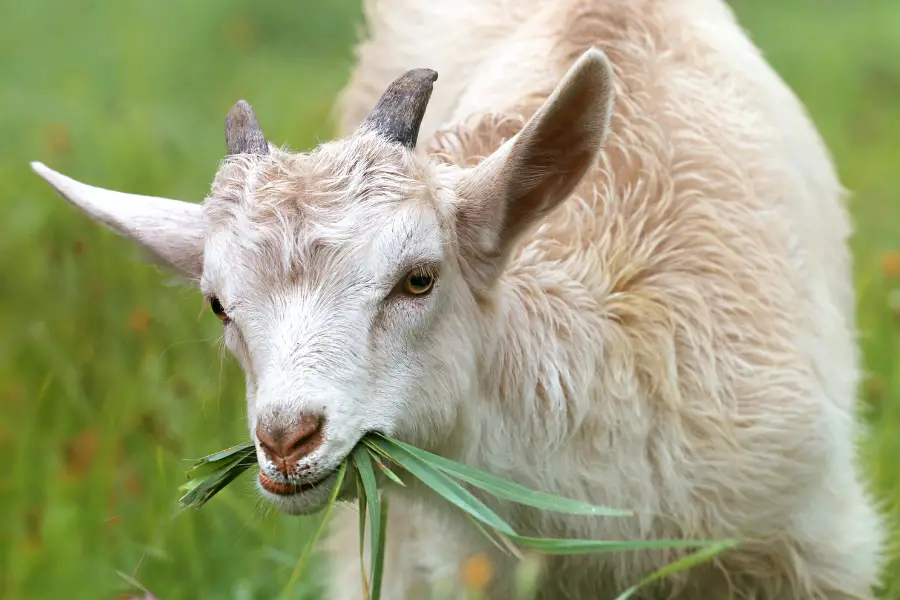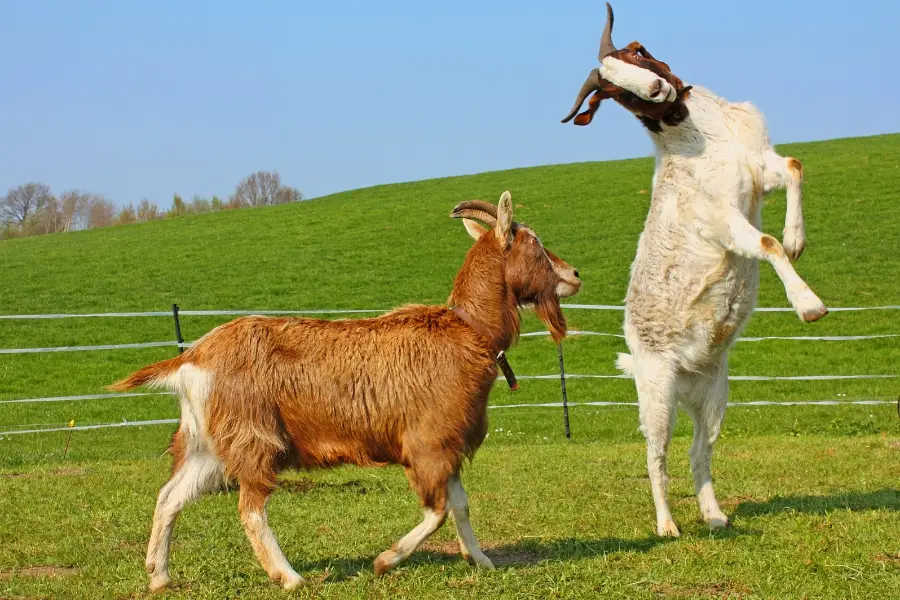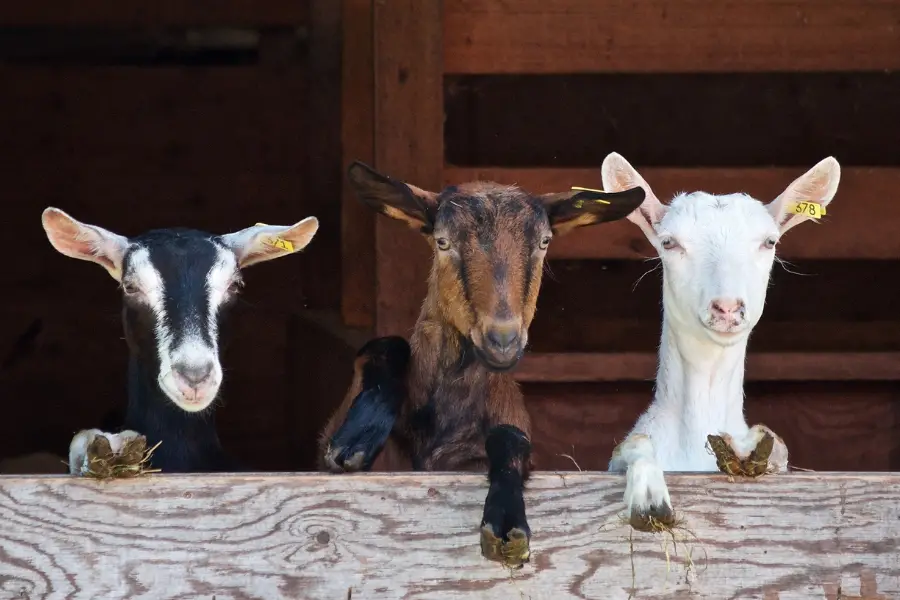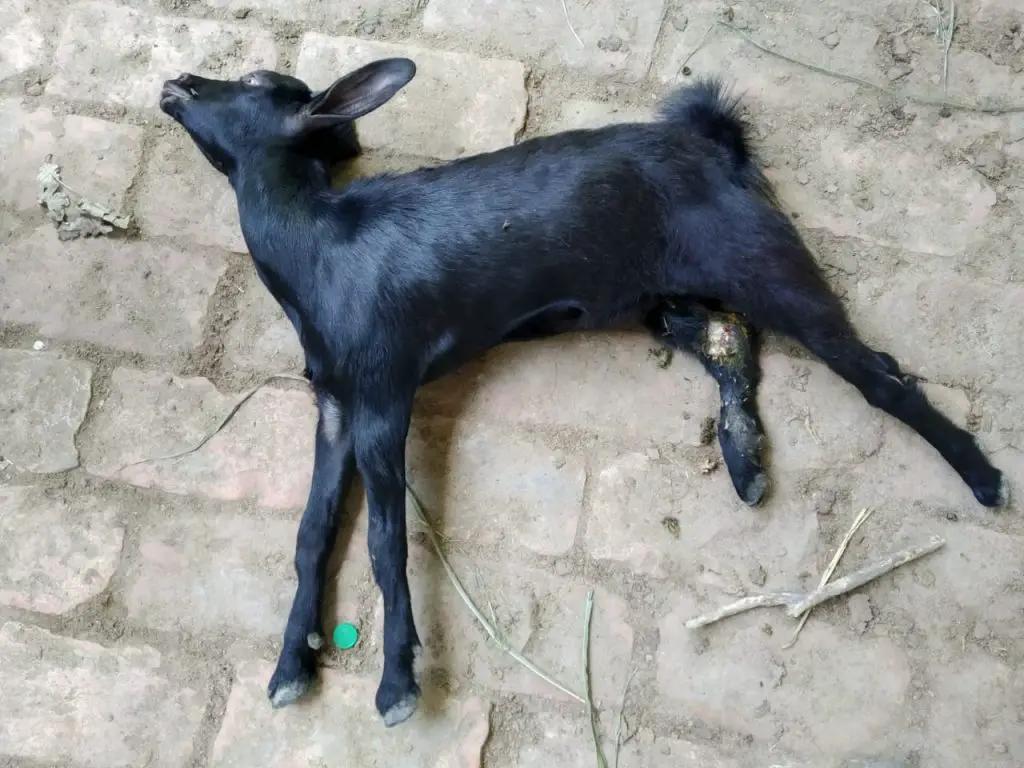
Tetanus in goats is a serious health concern caused by the bacterium Clostridium tetani, which can lead to severe muscle stiffness and even death if left untreated.
Unfortunately, common activities such as ear tagging and hoof trimming may inadvertently introduce this dangerous infection. As goat owners, it’s crucial to understand the causes, symptoms, and treatment options for tetanus in your herd to ensure their well-being.
Table of contents
Key Takeaways
- Tetanus in goats is caused by the bacterium Clostridium tetani, which thrives in anaerobic environments such as wounds which can be caused by bites, accidental punctures, or caused by human activities like hoof trimming and disbudding.
- Symptoms of tetanus in goats include stiffness and muscle rigidity, difficulty swallowing, lockjaw, seizures, and respiratory paralysis if left untreated.
- Prevention through proper wound care and annual vaccination with a CDT vaccine can significantly reduce the risk of tetanus infections in goats. Treatment options include antitoxin administration to neutralize the toxin produced by Clostridium tetani bacteria; antibiotics are also an essential part of treating this disease. Early intervention saves lives!
Causes Of Tetanus In Goats
The leading cause of tetanus in goats is the bacterium Clostridium tetani, which thrives in anaerobic environments such as deep puncture wounds which can be caused by accidents, fighting, bites, deep abrasions, or through activities such as hoof trimming, ear tagging, castration, or disbudding.
Clostridium Tetani Bacteria
Clostridium tetani bacteria are the primary cause of tetanus in goats. These spore-forming, anaerobic bacteria can be found naturally in soil, dust, and animal feces. Under certain conditions, they produce a potent neurotoxin that affects an animal’s central nervous system leading to severe muscle stiffness and spasms.
A real-life incidence observed on a dairy farm sheds light on this serious problem: A goat accidentally stepped on a rusty nail which went unnoticed for some time until it showed unmistakable symptoms of tetanus.
In another instance involving castration, improper sterilization techniques led to wound contamination resulting in infection by Clostridium tetani bacteria and eventual development of this potentially fatal condition.
Wound Contamination
Wound contamination is a significant factor leading to tetanus in goats. This often occurs when deep puncture wounds or cuts become infected with Clostridium tetani bacteria, which thrive in low-oxygen environments.
For instance, an injury could result from routine activities such as hoof trimming if proper care and sanitation are not observed during the process.
In some cases, seemingly minor events can cause serious complications. Take the example of a goat developing tetanus after being accidentally scratched by another goat’s horn while play-fighting.
The wound may then be exposed to the bacteria, ultimately leading to muscle stiffness and potentially life-threatening symptoms if left untreated.
Symptoms of Tetanus in Goats
Tetanus in goats symptoms include stiffness and muscle rigidity, difficulty swallowing, lockjaw, seizures, and more.
Stiffness And Muscle Rigidity
Stiffness and muscle rigidity are among the most prominent symptoms of tetanus in goats. These signs result from the Clostridium tetani bacterium releasing a potent neurotoxin that affects the goat’s central nervous system, leading to uncontrollable muscle contractions.
For instance, you might notice a change in your goat’s gait due to muscle stiffness or observe difficulty chewing and eating as their jaw muscles become rigid. This could be particularly evident during routine tasks such as hoof trimming or feeding time when movement is essential.
Additionally, remaining vigilant for other related symptoms like drooping eyelids, changed voice, or erect ears can help detect a potential tetanus infection sooner rather than later.
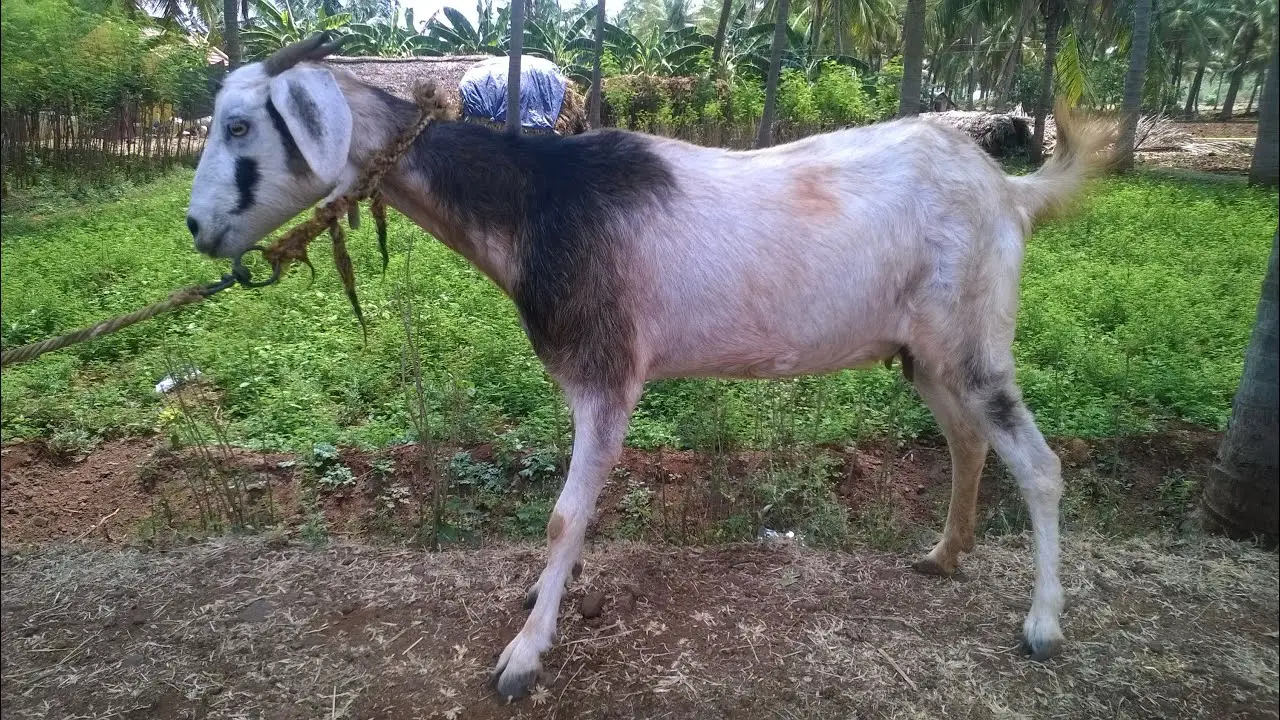
Difficulty Swallowing
Difficulty swallowing is a common symptom associated with tetanus in goats. It occurs when the muscles responsible for controlling swallowing are affected by the toxins produced by Clostridium tetani bacteria.
If you suspect your goat has contracted tetanus and notice difficulty swallowing, seek veterinary assistance immediately. The sooner treatment begins, the better chance your goat has of survival.
Good wound care practices and annual vaccination can help prevent tetanus infection in goats from occurring in the first place.
Lockjaw
One of the most common symptoms of tetanus in goats is lockjaw. This occurs when the muscles responsible for opening and closing the goat’s mouth become stiff and rigid, making it difficult or impossible for them to eat or drink.
Lockjaw is a serious condition that requires immediate veterinary attention, as it can quickly lead to dehydration and malnutrition if left untreated. Additionally, lockjaw can make it difficult for goats to receive any necessary medications orally, further complicating their treatment process.
Seizures
Tetanus in goats can lead to seizures, which is a serious symptom that requires urgent attention. During a seizure, a goat’s muscles will contract uncontrollably and they may also experience convulsions.
It’s important to note that once seizures start, recovery becomes less likely, so it’s essential to have your goat receive immediate treatment if you suspect they have tetanus.
Prevention through proper wound care and vaccination with CDT is key in avoiding these life-threatening symptoms altogether.
Diagnosis Of Tetanus In Goats
Diagnosis of tetanus in goats is typically based on clinical signs, such as muscle stiffness and lockjaw, along with laboratory tests including the polymerase chain reaction (PCR) test to confirm the presence of Clostridium tetani bacteria.
Clinical Signs
When a goat is infected with tetanus, it typically takes between 7 and 14 days for symptoms to appear. One of the most common signs of tetanus in goats is stiffness and muscle rigidity, particularly in the hind legs.
As the disease progresses, other clinical signs may develop, including difficulty swallowing due to jaw stiffness (lockjaw), trembling muscles, elevated body temperature, erect ears or tail and even seizures.
In some cases, goats may also experience respiratory paralysis and asphyxiation.
It’s important to keep an eye out for early warning signs since tetanus can progress very quickly once it takes hold. Some animals are more susceptible than others — younger animals are generally more prone to infection than older ones due to their under-developed immune system.
Vaccination plays a crucial role in preventing tetanus in goats which is why regular vaccination with the CDT Vaccine should be a part of every herd health program.
Laboratory Tests
If your goat is showing signs of tetanus, such as muscle stiffness and difficulty swallowing, laboratory tests can help diagnose the condition.
These tests can detect the tetanus toxin and identify the bacteria causing the infection.
To prevent tetanus in goats, it’s important to practice proper wound care and annual vaccination with a CDT vaccine. However, if your goat does become infected with tetanus, antibiotics and anti-inflammatory medication may be necessary alongside tetanus antitoxin injections.
Treatment Options For Tetanus In Goats
Treatment for tetanus in goats includes high doses of penicillin, anti-inflammatories, and tetanus antitoxin. It is crucial to search for the initial site of injury and bacterial proliferation before beginning the wound-cleansing process.
Infiltration with tetanus antitoxin can reduce the absorption of more preexisting toxin during tissue manipulation. Excessive tissue manipulation may worsen the animal’s condition, so it must be done carefully.
Unfortunately, unless it is caught early, treatment for tetanus is often unsuccessful. Contact your vet immediately if you think a goat shows signs of tetanus. You are your vet should work as a team to determine the best course of action.
Antitoxin Administration
Antitoxin administration is an essential aspect of the treatment for tetanus in goats. The antitoxin works to neutralize the toxin produced by Clostridium tetani bacteria, preventing further damage to the animal’s nervous system.
When administered early in the disease process, antitoxin has been shown to be effective in improving clinical signs and reducing mortality rates.
Antitoxin is not a vaccine, and the vaccine still must be administered.
It is also important for goat owners to understand that prevention through annual vaccination is crucial. Tetanus can be fatal if left untreated and can occur from even small puncture wounds or chronic infections.
Providing good wound care and promptly addressing any injuries or infections will also decrease the likelihood of tetanus developing.
Antibiotics
If your goat has contracted tetanus, antibiotics are an essential part of the treatment process. Penicillin is typically prescribed by a veterinarian to help combat the infection caused by Clostridium tetani bacteria.
It’s important to note that while antibiotics can be effective in treating tetanus in goats, they should only be administered under the guidance of a veterinarian. In addition, using high doses or administering them for too long can lead to adverse side effects or contribute to antibiotic resistance.
Proper wound care and cleaning also play a crucial role in healing from tetanus, so make sure to follow all instructions given by your vet closely.
Tetanus Goat Supportive Care
During treatment for tetanus in goats, supportive care is essential. Since the animal may have difficulty eating and drinking due to lockjaw, it’s important to offer soft foods and liquids that they can swallow easily.
Additionally, sheltering your goat against weather changes, preventing any type of noise or disturbance around them that may cause anxiety or excitement. Keeping their environment quiet and stress-free would ease off activities around this period (if other animals are within their enclosure), giving enough space whenever possible so they don’t come in contact with another goat or it’s offspring.
Prevention Of Tetanus In Goats
Prevention of tetanus in goats is crucial and more effective than treatment; proper wound care, such as cleaning and disinfection, avoiding overeating disease, and proper vaccination along with an annual booster of the CDT vaccine are essential steps to prevent this potentially fatal disease.
Proper Wound Care
Proper wound care is crucial in preventing tetanus in goats. Deep puncture wounds are of most concern because the bacterium that causes tetanus, Clostridium tetani, is sensitive to oxygen.
Goats can get wounds from a variety of sources, such as dog bites or surgical operation wounds like castration or disbudding. Any injuries should be watched closely and kept clean and dry for proper healing.
Prevention of tetanus in goats through good animal husbandry practices is essential. All tools should be sterilized prior to use and sterilized again before being used on another goat.

Tetanus Goat Vaccination
Annual vaccination with tetanus toxoid in the CDT vaccine is the most effective way to prevent tetanus in goats. All goats should receive the booster vaccine, regardless of age or sex.
Kids must be vaccinated initially at 5 to 6 weeks of age and again 3 to 4 weeks later.
Vaccination protects goat herds from this deadly bacterial infection, which can quickly lead to respiratory paralysis and death if left untreated. Vaccinated animals may still become infected, but their symptoms are typically less severe than those who were not vaccinated.
Video- Official OSU Video on Goat Tetanus Vaccine
In this official video from Oklahoma State University Cooperative Extension service, veterinarian Dr. Gene Parker discusses tetanus shots for goats. The section about tetanus begins at 4:01. Dr. Parker is a clear and informative speaker, and well worth listening to. At 11:41, he discusses when he has most often used tetanus antitoxin.
Conclusion
In conclusion, tetanus in goats can be a serious and potentially fatal condition. It is caused by the Clostridium tetani bacteria that enters through wounds or injuries to the skin.
Prevention plays an important role in combating tetanus in goats as it is easier and more economical than treatment.
Treatment options include high doses of penicillin, anti-inflammatories and tetanus antitoxin injection which must be carried out immediately before excessive tissue manipulation takes place. Unless it is caught early, treatment is not usually rewarding.
When it comes to goat health management practices, prevention remains key to protecting your animals against diseases like tetanus.
FAQs about Tetatus in Goats
When goats have an open wound, it can become infected by the Clostridium tetani bacteria, which releases a toxin that causes tetanus. Wounds that are deep are particularly susceptible.
Tetanus in goats is caused by a bacterium called Clostridium tetani which can enter their system through open wounds, especially puncture wounds. This bacteria thrives in soil and manure and once it enters the body, it produces toxins that cause muscle stiffness, spasms, and other symptoms associated with tetanus.
Symptoms of tetanus in goats include difficulty moving or walking due to muscle stiffness or contractions (especially around the face and neck), droopy ears, protruding third eyelids, inability to eat or drink normally due to jaw spasm or lockjaw, fever accompanied by signs of dehydration such as sunken eyes and dry mouth.
If you suspect your goat has contracted Tetanus, immediately seek veterinary assistance as soon as possible for accurate diagnosis and treatment options tailored specifically toward relieving their pain & discomfort while eradicating bacterial sources responsible for inflammation within animals’ body systems. Treatment often involves administering antibiotics such as penicillin along with anti-inflammatory drugs like corticosteroids but animal-specific treatments may vary depending upon individual health needs.
All goats should be vaccinated on a yearly schedule, preferably in winter. If you get a new goat and are unsure of its status, vaccinate it immediately. Kid goats should be vaccinated at about 6 weeks and then receive a booster about 4 weeks later.
You want the does to get the vaccine prior to giving birth so that they have time to build up immunity and make antibodies that will be transmitted to the kids in the colostrum. If you are vaccinating the does in winter, it is then convenient to vaccinate the whole herd.
Vaccinating your goats against Clostridial diseases including Tetanus is an effective prevention method particularly if living in areas prone to exposure though grazing pastures infected with decaying organic matter & fecal remains left behind by soil’s natural inhabitants; additionally It’s important to maintain clean environments where sheltering animals because injuries contaminated this way play large role spreading infections captured by these organisms so maintaining hygiene both inside & outside barns/shelters also plays crucial role keeping livestock healthy across all seasons!


